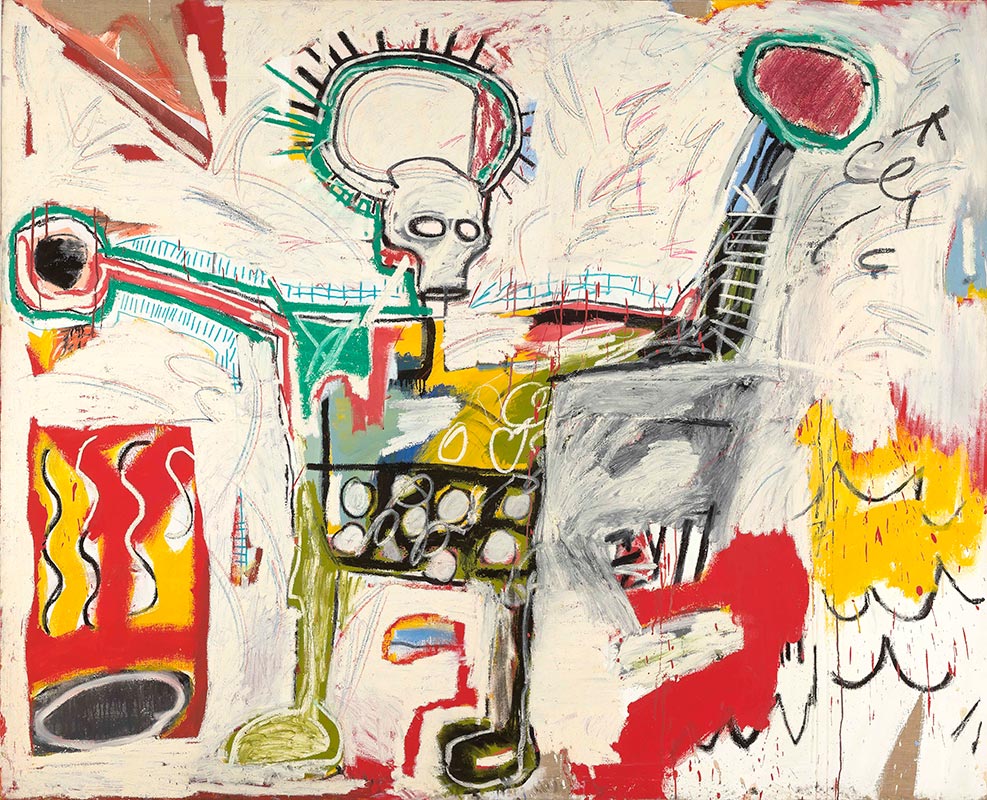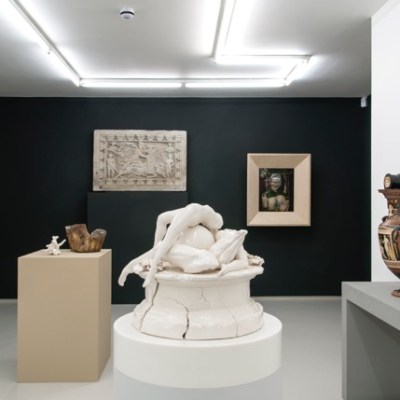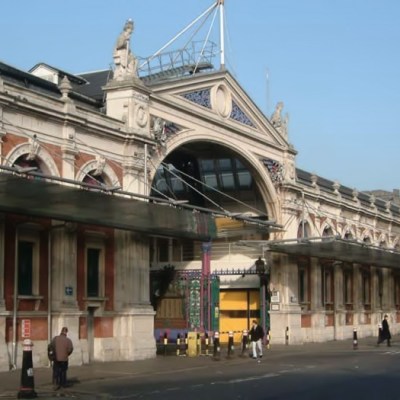Few artists have garnered as much mystique in life and death as Jean Michel Basquiat. From the energy he poured into his canvases to his commentaries on black identity, his links with emerging hip-hop and street culture, to the numerous collaborations with Andy Warhol, his premature death at the age of 27 and the posthumous price tags attached to his sought-after works, he has long been a source of fascination. ‘Now’s the Time’ is the first large-scale Basquiat exhibition on Canadian soil, with works on loan from across the world.
The title is multifaceted, referencing Martin Luther King’s iconic speech and highlighting the vital relevance Basquiat’s work retains in the wake of ongoing racial tensions and power struggles in contemporary North America. That the exhibition is situated in Toronto also seems fitting. Its melting pot demographic and relative proximity to New York – a city so intertwined with Basquiat’s aura – offers an alternative context in which to consider the works.
This is matched by Dieter Buchhart’s alternative curatorial approach, offering the first ‘thematic’ presentation of Basquiat’s art, borrowing from surrounding cultural touchstones in addition to signifiers within the paintings.
Horn Players (1983), Jean-Michel Basquiat. The Broad Art Foundation. Photograph: Douglas M. Parker Studio, Los Angeles © Estate of Jean-Michel Basquiat. Licensed by Artestar, New York

A Charlie Parker soundtrack loops overhead as you enter the first section ‘Street As Studio’, encountering a large homage to a Parker vinyl record on the way. This opening section displays some of Basquiat’s earliest works, with childlike trains, planes and automobiles depicted alongside the darker realities of his surrounding environment, such as a homeless and wheelchair-bound war veteran. Many of the works are on salvaged supports, boards and fence posts showing his drive to utilise surfaces, as well as subject matter, from the street.
In ‘Heroes and Saints’, victorious boxers with spiked halos and arms aloft set out to reclaim some of the ground lost to an overwhelmingly white art history. They still pack a furious punch when seen in the flesh. The ‘Reclaiming Histories’ and ‘Unidentified Black Males’ displays assert similar notions, while drawings such as Untitled, False Economy (1985) celebrate Basquiat’s wily political satire. In a section titled ‘Mirroring’ Basquiat’s homage to Michael Stewart, who died following his arrest for graffitiing a subway station, not only reflects parallels with the artist (after learning of Stewart’s death Basquiat famously commented ‘it could have been me’) but also has an urgent present relevance in light of continuing police profiling and institutional racism.
Untitled (1982), Jean-Michel Basquiat Museum Boijmans Van Beuningen, Rotterdam Photogaph: Studio Tromp, Rotterdam © Estate of Jean-Michel Basquiat. Licensed by Artestar, New York

Some of Basquiat’s lesser-known work includes references to art history. A doodle of young and old Picasso is particularly charming, while a series of line drawings take their inspiration from Leonardo da Vinci’s anatomical studies. It seems a shame that the second of these is relegated to a wall beyond the exhibition space, as if the series didn’t fit with the pre-determined categories – a downside, perhaps, to thematic curating.
The latter portion of the exhibition is dedicated to Basquiat’s collaborations with New York’s other art darling Andy Warhol, a prolific if unlikely partnership given their seemingly different ideals in terms of the capitalist system. It seems ironic too that before leaving the gallery you are forcibly channelled into a pop-up shop selling a range of tenuous Basquiat merchandise. It is understandable that the AGO should want to take advantage of an exhibition with such sellable content, but it does raise questions about how best to generate income without compromising the integrity and values of the exhibition.
Overall, ‘Now’s the Time’ is well considered, and manages to bring a wide selection of works together without losing pace or energy. Occasionally it slips a little far into indulgent contextualisation, trying too hard to establish a sense of broad appeal. Without all these extraneous links and references, Basquiat’s work is more than strong enough to stand alone.
‘Jean Michel Basquiat: Now’s the Time’ is at the Art Gallery of Ontario, Toronto, until 10 May.
Related Articles
From the mass market to the museum: ‘Warhol Mania’ in Montreal (Elizabeth Grant)



